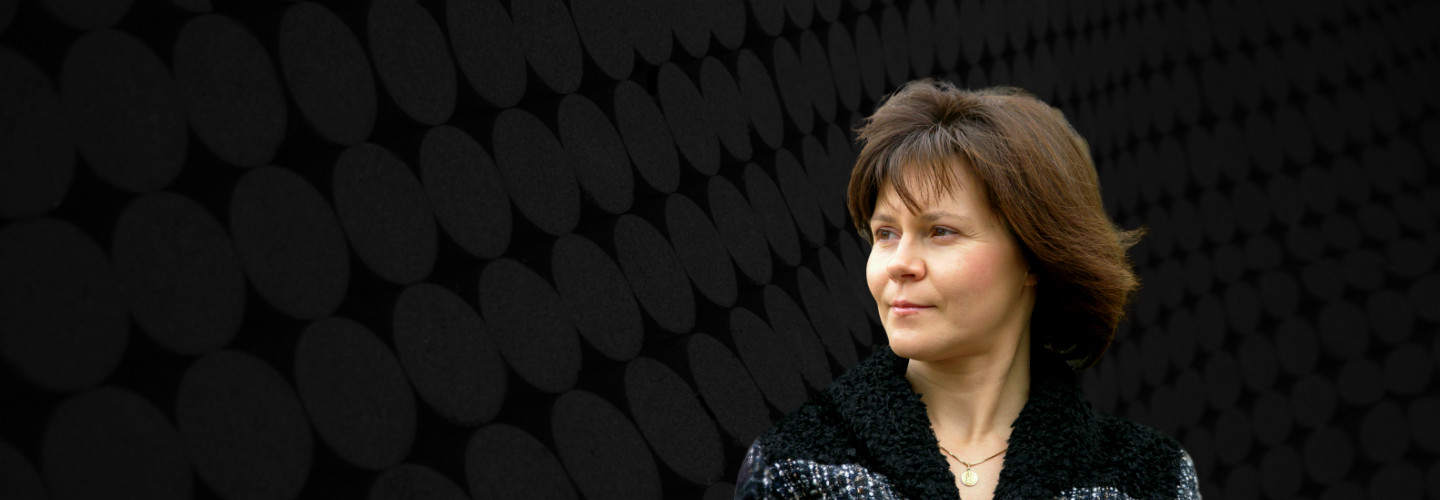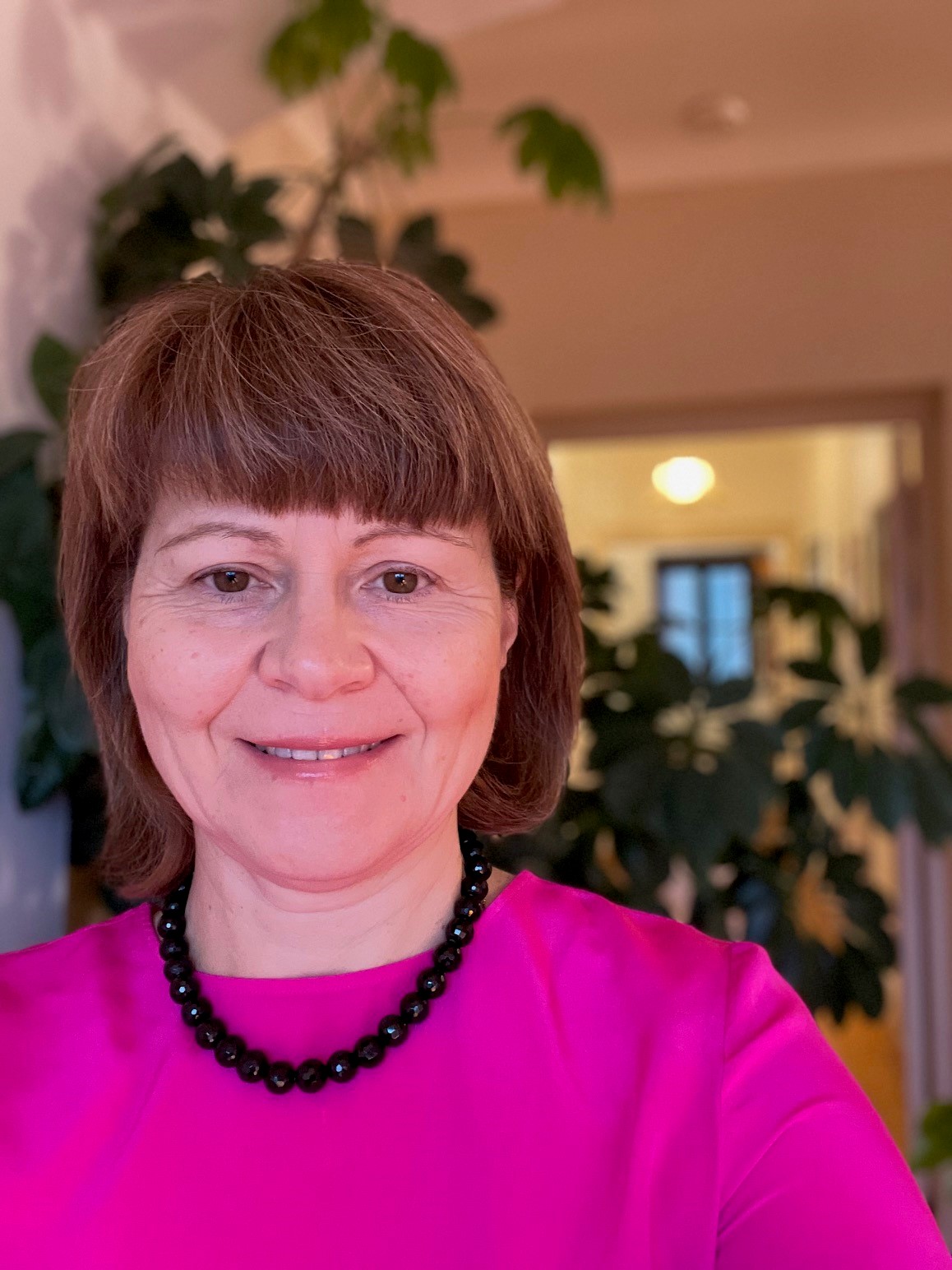
Works by Victoria Borisova-Ollas
Biography
Victoria Borisova-Ollas was born in 1969 in Vladivostok, a distance of over 9.200 km from Moscow, in the far eastern corner of Russia. In those years there was probably precious little to indicate that the Soviet Union would collapse within a couple of decades. Borisova-Ollas was born late enough to enjoy the freedom afforded by the new political system – such as the freedom to travel – but also early enough to profit from the advantages of the Soviet system of music education. A system which enabled the talented girl to move to Moscow, enrol in the Central Music School and then in the Tchaikovsky Conservatory where she mastered the craft of composition.
At the Conservatory, Borisova-Ollas studied with a number of brilliant teachers. They included Nikolaj Korndorf (1947–2001), to this day a paragon she admires, as witnessed by the dedication of her orchestral work The Kingdom of Silence (2003), a kind of requiem in memory of her professor.
The young composer continued her studies in Britain and in Sweden where she settled in 1992. Predictably enough, a question that is put to her again and again by journalists commissioned to write her portrait concerns the “nationality” of her music. Is she a Russian composer? To what extent has she been influenced by her studies in the West?
Borisova-Ollas refuses to be pinned down to any unequivocal statement. Her music, she says, is “just a healthy blend of everything”, her idiom being closest to the cautious modernism of much of British music. Indeed, you cannot describe her idiom as “avant-garde” by any means. She writes music with the avowed aim of communicating images, sensations, perhaps even messages to her audience.
The urge to communicate could derive from her Soviet or Russian background. In her native country, she says, artists, such as composers, feel a moral responsibility towards society. This is not always the case elsewhere where composers are often preoccupied with musical concerns of a technical nature.
Unlike so many of her compatriots in exile who have over the centuries felt bound to their native country with passionate dedication, Borisova-Ollas is indifferent to the place where she happens to be living: the main thing is, she says, that it is equipped with a working musical infrastructure.
Her messages are often of a religious nature, her main source of inspiration being the Book of Psalms. The titles she chooses for her compositions have frequently been drawn from sacred texts and she says the moment she has settled upon one, images flock to her: choosing a title is the first step, it determines the music she is about to write.
Painting is another source of inspiration. A picture by Malevich gave her ideas for her first symphony, The Triumph of Heaven (2001); three paintings by Chagall are behind Roosters in Love (1999).
Literature plays a role as well: Colours of Autumn (2002) is drawn from Nabokov’s Lolita and Salman Rushdie’s The Ground Beneath Her Feet is the basis of her eponymous composition which she calls “a staged performance for orchestra, singers and narrator” (2006). More recently, she drew on Shakespeare in writing a work for trombone and orchestra: Hamlet. A Drama (2007) has the soloist improvise and even recite from the play. Indeed, the idea for the work – the “show” – came from the trombone player, Elias Faingersh, who took an active role in elaborating the definitive version of the solo part. Victoria Borisova-Ollas “merely” provided the orchestral background.
Sounds – especially as suggestive ones as bells – also give rise to musical ideas. The bells of Munich pealed in her mind, so to speak, when she set about composing a work for the Munich Philharmonic Orchestra: Angelus (2008)was commissioned to mark the 850th anniversary of the city’s foundation.
Victoria Borisova-Ollas has over the years received a number of prestigious prizes, beginning with the Masterprize International Competition for Orchestral Composition where she came second in 1998, an Award of the Royal Swedish Academy for her Symphony No. 1 in 2005, an Award of the Swedish Music Publishers Association for The Ground Beneath Her Feet in 2008 and the Hilding Rosenberg Prize of the Swedish Composers’ Association in 2009.
In 2011, Borisova-Ollas became the first woman ever to win the Swedish Christ Johnson Prize for Composition from the Swedish Royal Academy of Music. The prize was awarded for her clarinet concerto Golden Dances of the Pharaohs.
The world premiere of Creation of the Hymn took place in 2013 in Stockholm at the Tonsättarweekend – a composer portrait dedicated to Borisova-Ollas.
In December 2015 her work Vinden som ingenting minns for choir and orchestra was premiered at the Örebro Konserthus.
On 13 February 2017 she was awarded Expressen’s annual Spelmannen culture award.
Borisova-Ollas is currently working on a new piano concerto for the Swedish pianist Peter Jablonksi.

